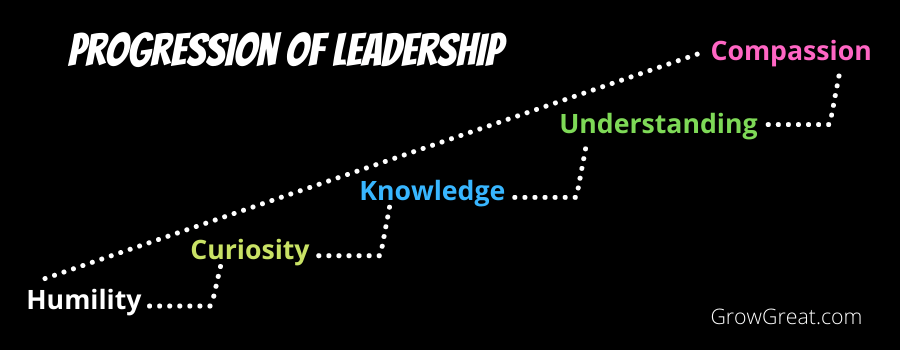Podcast: Play in new window | Download (Duration: 11:11 — 10.2MB)
Subscribe: Apple Podcasts | Spotify | RSS | More
Day 25. The countdown begins as we’re winding our way down in this 30-Day Micro Leadership Course, but we’re going to finish strong with some pivotal lessons.
The vertical pressures every leader must manage are “boots in the dirt” versus “eye in the sky.” Now we’re going to consider the horizontal pressures, “YOU” versus “a focus on others.”
Back on day 13, we talked about the power of the corner. Helping clients paint themselves into a corner where they’re able to face themselves in the mirror and stop making excuses is a major component of the value I provide. It’s work that’s entirely focused on them, which could sound selfish until you understand the context. Self-awareness and self-improvement are necessary if we’re going to increase our value to others. It’s not selfish because the work is about getting better, growing, and making ourselves better able to serve others. The ROI (return on investment) is higher than anything you can do – for yourself and anybody in your life.
Imagine if we all were able to paint ourselves into that corner where we could at long last eliminate all the excuses in our lives. Where we could finally start doing the work of a hero, not a victim. Think of all the positive impacts we could have individually and collectively were to do that. Well, that’s the point of putting a focus on YOU.
Like the vertical pressures, these horizontal pressures swing back and forth as needed. At any given point you’ll be in one vertical spot and one horizontal spot. Circumstances will warrant which. Depending on your role and responsibilities you’ll likely be spending more time in some than others. For example, yesterday we talked about how the higher up you go in your leadership the more likely you’ll spend more time in the sky than in the dirt. It’s also likely that the higher you go – the more experienced you are – the more you’ll focus on others and less on yourself. Many excellent senior leaders find themselves with more long-term strategic thinking (eye in the sky) and thinking of how to best serve their employees (focus on others), but almost all admit they’re constantly and consistently trying to figure out how to improve themselves (YOU). There are no hard, fast rules. The key is knowing when to go where and knowing how long to stay there.
These horizontal pressures are very different than the vertical ones because these two aren’t quite as distinctly different. Humility is key to it all.

The most accomplished and effective leaders confess they’re always focused on these two horizontal pressures simultaneously. That’s very different than boots in the dirt and eye in the sky work. But it’s not only possible, but it’s also preferable.
The ER physician invested money and years to learn the skills necessary to treat patients effectively. She didn’t just check the box on her learning and then stop. She’s constantly learning and improving, focusing on herself. But her focus is purpose-driven. She’s doing all this work for herself because it’s her choice – her life – but she’s also doing it because she wants to help others.
The same is true for leadership.
Get focused on yourself so you can positively influence others and so you can do for others what they can’t do for themselves.
Besides, how hypocritical is it for leaders to expect and urge others to grow and improve if they’re unwilling to do that themselves? Don’t be a hypocrite.
A focus on others. That’s where the rubber meets the road.
Your impact on the group, team, or organization is your ability (your willingness) to serve others in ways few others (perhaps nobody) can. Willingness is such a strong part of leadership success because not everybody is willing to surrender to the high value they can supply to others. Most of us are intently focused on ourselves in selfish ways.
These 2 pressure points must be simultaneously pursued at all times. Turns out the highest performing leaders operate in 3 of the 4 areas simultaneously at all times, and know when to enter that 4th area as needed – boots in the dirt. For good reason…
Influence on others and doing for others what they can’t do for themselves is the focal point of all the work. THAT’S why great leaders operate 100% of the time in 3 of the 4 areas and choose to selectively operate in the 4th only as needed. That’s where the highest service is rendered.
By focusing on others, leadership knows not to rob people of opportunities to learn, grow, develop, improve and contribute. The details that are vital to any enterprise are mostly performed by the people who do those jobs daily. And mostly, they’re able to handle it well. On some occasions – like the vendor contract with costly cloud storage – the leader needs to dive down into the dirt to make sure the team has the most success. The leader isn’t doing this to embarrass or show up the team. No, she did it to protect the people and the organization. And in doing that, she taught a lesson nobody will ever forget. Everybody learned from it. And success was insured. She did for the department what they weren’t yet able to do for themselves. But that was then, this is now. NOW, they better understand to pay closer attention to the finer points of negotiation.
Leaders (a’hem bosses) to stay in the details of everybody’s business are robbing people of opportunities to grow and accept responsibility for their own work. Thinking, “I can do this better than them,” isn’t the point. Can you grow them so they can outperform you? That’s one point. Can you help people grow individually and collectively so the entire group performs at levels never before achieved? That’s a point. Can you make a positive difference that otherwise might not be made if you weren’t involved? That’s the point.
Do you make others betters because of the high value you bring to their lives?
Great leaders do.
Be well. Do good. Grow great!

 About the hosts: Randy Cantrell brings over 4 decades of experience as a business leader and organization builder. Lisa Norris brings almost 3 decades of experience in HR and all things "people." Their shared passion for leadership and developing high-performing cultures provoked them to focus the Grow Great podcast on city government leadership.
About the hosts: Randy Cantrell brings over 4 decades of experience as a business leader and organization builder. Lisa Norris brings almost 3 decades of experience in HR and all things "people." Their shared passion for leadership and developing high-performing cultures provoked them to focus the Grow Great podcast on city government leadership.
The work is about achieving unprecedented success through accelerated learning in helping leaders and executives "figure it out."
